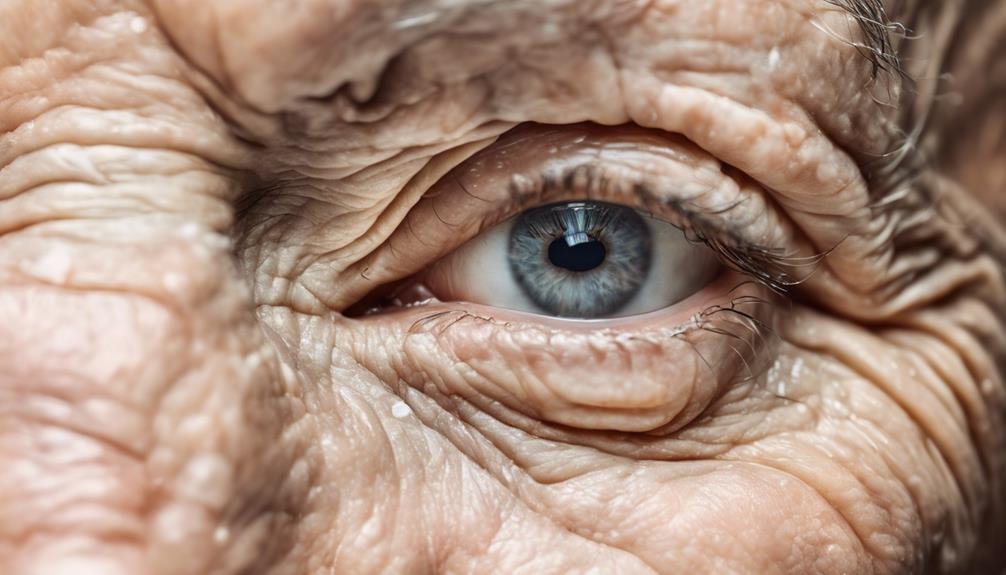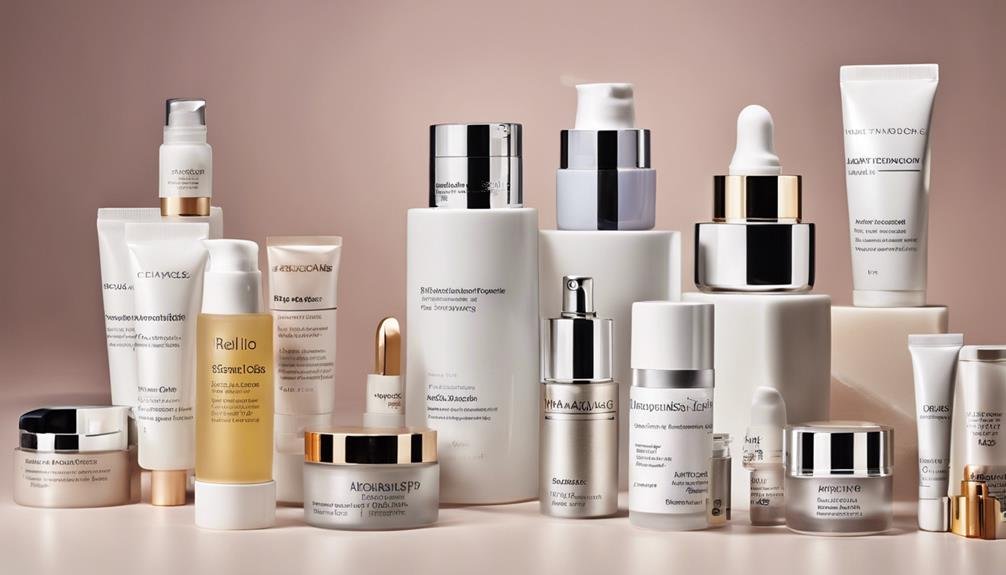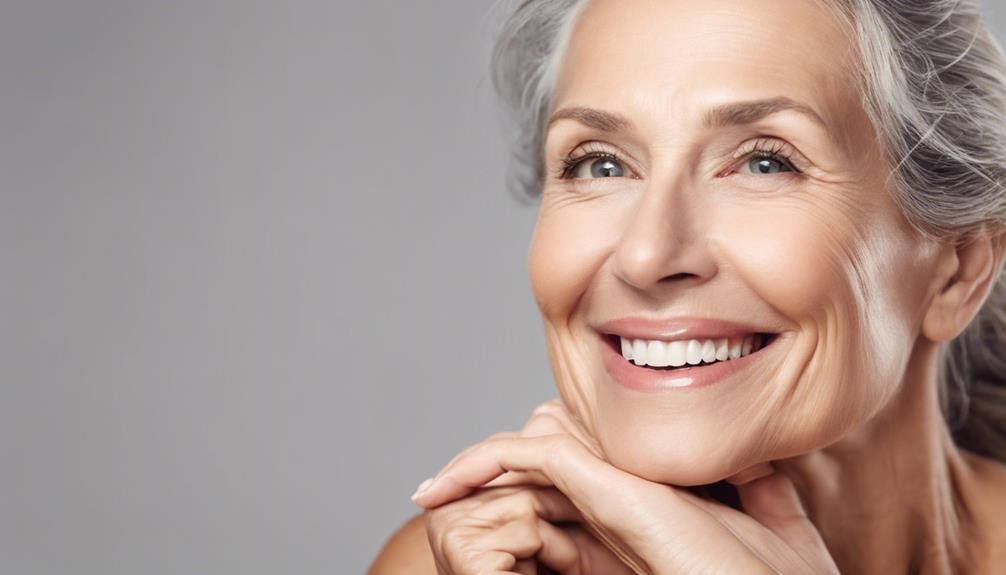As you navigate the realm of mature skincare, the key lies in understanding the intricate needs of aging skin. Embracing a tailored regimen that addresses specific concerns such as collagen depletion and elasticity loss is paramount. But what if there was a simple yet effective way to revitalize your skin, restoring its radiance and firmness? Stay tuned as we unveil the secrets to nurturing mature skin that transcends time and exudes a vibrant, youthful glow.
Understanding Mature Skin
As you age, your skin undergoes natural changes that require specific care and attention. One of the key aspects to understand about mature skin is the decrease in skin elasticity and collagen production. Skin elasticity refers to your skin's ability to stretch and bounce back, giving it a youthful and firm appearance. Collagen, a protein that keeps your skin plump and wrinkle-free, starts to decline as you age, leading to sagging and fine lines.
To address these changes, it's essential to incorporate skincare products and routines that promote collagen production and improve skin elasticity. Look for products containing ingredients like retinol, vitamin C, peptides, and hyaluronic acid, which can help stimulate collagen synthesis and enhance skin firmness.
Additionally, practices like facial massage, regular exercise, and a healthy diet rich in antioxidants can also support skin elasticity and collagen levels.
Understanding the dynamics of skin elasticity and collagen production is crucial in developing a skincare routine tailored to mature skin's specific needs. By focusing on these aspects, you can maintain a healthy and radiant complexion as you gracefully embrace the aging process.
Daily Skincare Routine
Maintaining a consistent daily skincare routine is essential for nurturing mature skin and addressing its unique needs. To effectively care for your mature skin, consider incorporating anti-aging serums and night creams into your daily regimen. Anti-aging serums can help target specific concerns like fine lines, wrinkles, and age spots, while night creams provide intense hydration and nourishment during the skin's rejuvenation process overnight.
Daily Skincare Routine Table:
| Morning Routine | Evening Routine | Additional Tips |
|---|---|---|
| 1. Cleanse face with a gentle cleanser | 1. Cleanse face to remove makeup and impurities | – Use sunscreen daily to protect against UV damage |
| 2. Apply antioxidant-rich serum | 2. Use anti-aging serum to target specific concerns | – Stay hydrated by drinking plenty of water |
| 3. Moisturize with a day cream containing SPF | 3. Hydrate with a nourishing night cream | – Get enough sleep for skin regeneration |
Hydration and Moisturization
To effectively address the hydration and moisturization needs of mature skin, it's crucial to choose products that provide deep nourishment and retain moisture throughout the day. As skin matures, the skin barrier weakens, making it more prone to dryness and dehydration. Look for moisturizers with ingredients like hyaluronic acid, ceramides, and glycerin to help repair and strengthen the skin barrier, locking in moisture and preventing water loss.
Incorporating anti-aging treatments into your hydration routine can also be beneficial for mature skin. Ingredients such as retinol, vitamin C, and peptides can help stimulate collagen production, reduce fine lines and wrinkles, and improve skin texture.
Remember to apply your moisturizer on damp skin to seal in hydration better. Opt for richer, creamier formulas at night to deeply nourish your skin while you sleep. Consistent hydration and moisturization are key to maintaining a healthy, radiant complexion as you age.
Sun Protection Essentials
For effective protection against the harmful effects of UV radiation on mature skin, incorporating sun protection essentials into your daily skincare routine is paramount. Sunscreen application is a crucial step in shielding your skin from the damaging UVA and UVB rays that can accelerate aging and increase the risk of skin cancer. Look for a broad-spectrum sunscreen with an SPF of 30 or higher and remember to apply it generously to all exposed areas of your skin, including your face, neck, and hands.
UV protection isn't just for sunny days; it should be a year-round commitment. Even on cloudy or overcast days, UV rays can still penetrate through the clouds and cause harm to your skin. Make sure to reapply sunscreen every two hours, especially if you're outdoors or participating in water activities.
Additionally, consider wearing protective clothing, hats, and sunglasses to further shield your skin from the sun's harmful rays. Prioritizing sun protection essentials will help maintain the health and youthful appearance of your mature skin.
Targeted Treatments for Aging
As you continue to prioritize safeguarding your mature skin from the damaging effects of UV radiation, it's important to also address specific concerns related to aging skin. Anti-aging serums are potent formulations designed to target fine lines, wrinkles, and age spots. These serums often contain ingredients like retinol, vitamin C, and hyaluronic acid, which can help improve skin texture and promote a more youthful appearance.
Collagen boosters are another essential part of an anti-aging skincare routine. Collagen is a protein that provides structure to your skin, making it look plump and youthful. However, as we age, our collagen production decreases, leading to sagging and wrinkles.
Collagen-boosting treatments, such as peptides and growth factors, can help stimulate collagen production, improving skin firmness and elasticity.
When selecting targeted treatments for aging skin, look for products that are backed by research and have proven efficacy. Incorporating anti-aging serums and collagen boosters into your skincare regimen can help combat the visible signs of aging, giving you a more radiant and youthful complexion.
Nutritional Support for Skin
How can you support your skin nutritionally to enhance its health and vitality? Nutritional support plays a crucial role in maintaining mature skin's health and appearance. To promote skin health, consider the following:
- Antioxidant Supplements: Antioxidants like vitamins C and E, as well as selenium and beta-carotene, help combat oxidative stress and reduce signs of aging. Consider incorporating antioxidant-rich supplements into your daily routine to support your skin from within.
- Collagen Boosting Foods: Foods rich in collagen-boosting nutrients like vitamin C, zinc, and copper can help enhance skin elasticity and firmness. Include foods such as citrus fruits, nuts, seeds, and lean proteins like chicken or fish in your diet to support collagen production.
- Hydration: Remember that hydration is key for skin health. Drinking an adequate amount of water daily can help maintain skin elasticity and plumpness, reducing the appearance of fine lines and wrinkles. Incorporate hydrating foods like cucumbers, watermelon, and leafy greens into your meals to support skin hydration from the inside out.
Lifestyle Habits for Healthy Skin
To maintain healthy and vibrant mature skin, adopting beneficial lifestyle habits is essential. Stress management plays a crucial role in skin health. High stress levels can lead to skin issues such as acne, eczema, and psoriasis. Engaging in activities like meditation, yoga, or deep breathing exercises can help reduce stress and promote healthier skin.
Exercise benefits extend beyond just physical fitness; regular physical activity can also benefit your skin. Exercise increases blood flow, which helps nourish skin cells and keep them healthy. Additionally, sweating during exercise can help unclog pores and prevent breakouts. Aim for a mix of cardio and strength training exercises to maximize the benefits for your skin.
Incorporating stress management techniques and regular exercise into your daily routine can significantly impact the health and appearance of your skin. Prioritize these lifestyle habits to support your mature skin and maintain a youthful glow for years to come.
Frequently Asked Questions
Can Stress Impact the Aging Process of Mature Skin?
Yes, stress can impact the aging process of mature skin. By prioritizing stress management techniques and maintaining a consistent skincare routine, you can help mitigate the negative effects of stress on your skin's health and appearance.
Are Natural Remedies Effective for Mature Skin Concerns?
Natural remedies like dietary supplements and lifestyle changes can be effective for mature skin concerns. Incorporating antioxidant-rich foods and staying hydrated can improve skin health. However, consult with a dermatologist to ensure safety and efficacy.
How Does Pollution Affect Mature Skin?
Pollution accelerates skin aging by triggering oxidative stress. Environmental factors like pollution can lead to premature wrinkles and dullness in mature skin. Protect your skin by incorporating antioxidants into your skincare routine and cleansing thoroughly daily.
Can Certain Medications Accelerate Skin Aging?
Certain medications, such as corticosteroids and retinoids, can act as skin aging accelerants. These medication effects may lead to increased skin thinning, dryness, and susceptibility to damage. It's crucial to consult your healthcare provider for personalized advice.
Is It Normal for Mature Skin to Experience Hormonal Changes?
Yes, hormonal changes are common in mature skin and can lead to a hormonal imbalance affecting skin elasticity. It's essential to monitor these changes and adjust your skincare routine to address specific concerns that may arise.
Conclusion
Now that you have all the tools and knowledge to care for your mature skin, it's time to put it into action. By following a consistent skincare routine, prioritizing hydration and sun protection, incorporating targeted treatments, and supporting your skin with a healthy lifestyle, you can achieve a radiant and youthful complexion. Stay tuned for more tips and tricks to keep your skin looking its best!





